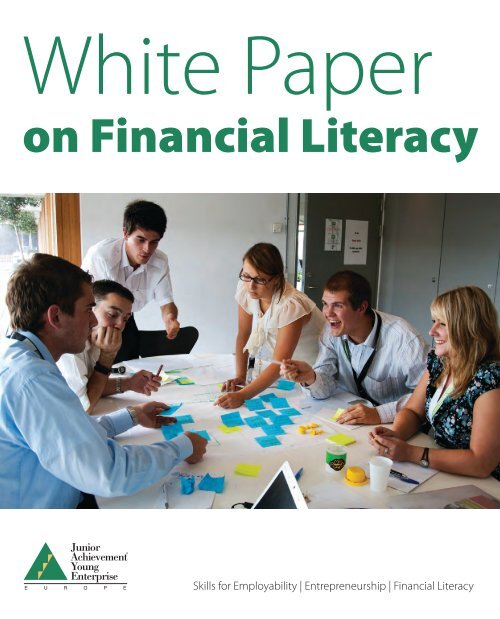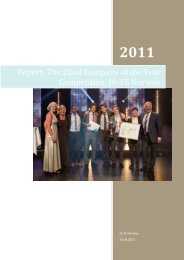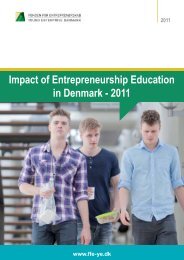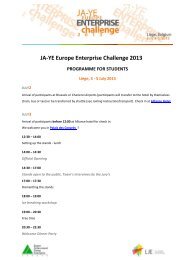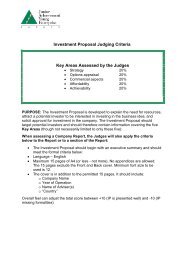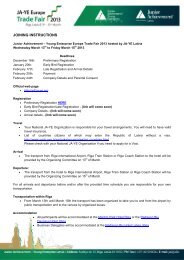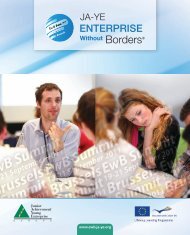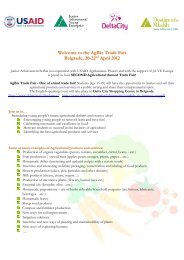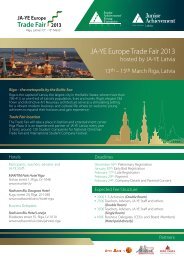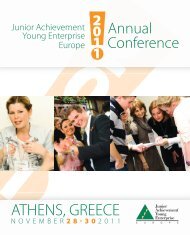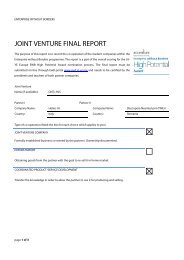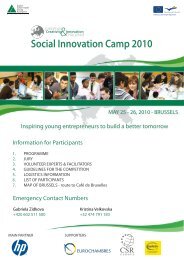White Paper on Financial Literacy - ja-ye europe
White Paper on Financial Literacy - ja-ye europe
White Paper on Financial Literacy - ja-ye europe
You also want an ePaper? Increase the reach of your titles
YUMPU automatically turns print PDFs into web optimized ePapers that Google loves.
<str<strong>on</strong>g>White</str<strong>on</strong>g> <str<strong>on</strong>g>Paper</str<strong>on</strong>g><br />
<strong>on</strong> <strong>Financial</strong> <strong>Literacy</strong><br />
Skills for Employability | Entrepreneurship | <strong>Financial</strong> <strong>Literacy</strong>
1<br />
Why do we need better financial educati<strong>on</strong>?<br />
At a time when levels of pers<strong>on</strong>al debt are at record highs, securing a<br />
loan to finance further educati<strong>on</strong>, set up home or start a business is<br />
increasingly difficult, and public spending cuts are going to severely<br />
impact every<strong>on</strong>e’s pers<strong>on</strong>al finances for <strong>ye</strong>ars to come, spare a<br />
thought for the younger generati<strong>on</strong>.<br />
Young people hit hardest.<br />
Young people entering the job market are experiencing record<br />
levels of youth unemployment: <strong>on</strong> average double that of the overall<br />
unemployment rate, and in countries like Spain up to a staggering<br />
40%. That’s almost 1 in 2 young people unable to find work 1 .<br />
Change in the unemployment rates over the last three <strong>ye</strong>ars:<br />
Country 2008 2009 2010<br />
Ireland 13.3 24.4 27.3<br />
Portugal<br />
16.4 20 22.3<br />
Spain<br />
24.6 37.8 41.6<br />
United Kingdom<br />
15 19.1<br />
Austria<br />
Germany<br />
Denmark<br />
Belgium<br />
France<br />
Finland<br />
Netherlands<br />
Norway<br />
Italy<br />
Greece<br />
Source Eurostat, 2010<br />
8 10 9.5<br />
9.9 10.4 9.1<br />
7.6 11.2 14.3<br />
18 21.9 22<br />
19.1 23.5 23.9<br />
16.5 21.5 21.4<br />
6.5 7.7 8.7<br />
7.2 8.9<br />
21.3 25.4<br />
22.1 25.8<br />
Not <strong>on</strong>ly that: research 2 shows that people who lose their jobs during<br />
a recessi<strong>on</strong> never really make up the pay gap, even when they find<br />
another job relatively quickly. What will future research reveal about<br />
the impact <strong>on</strong> young people who are waiting a <strong>ye</strong>ar or more just to<br />
get a foot <strong>on</strong> the jobs ladder?<br />
1<br />
The European Commissi<strong>on</strong>’s Employment in Europe 2010 report underlines<br />
how young people have borne the brunt of the crisis, with unemployment<br />
disproporti<strong>on</strong>ately hitting 15-24 <strong>ye</strong>ar olds. See summary of the report’s findings in<br />
the margin.<br />
2<br />
Chapter 3.5.3. asks: Does youth employment produce blemishes of lasting scars?<br />
And states that: “There isample evidence that a spell in unemployment early in adult<br />
life (i.e. in the early 20s) has l<strong>on</strong>g lasting negative effects in terms of both future<br />
employment and wage prospects, well bey<strong>on</strong>d the durati<strong>on</strong> of the initial episode”.<br />
Impact of the recessi<strong>on</strong> <strong>on</strong> young people<br />
in Europe according to the European<br />
Commissi<strong>on</strong> report <strong>on</strong> Employment in<br />
Europe 2010.<br />
The effect of the recessi<strong>on</strong> <strong>on</strong> young people<br />
(aged 15-24) has remained dramatic,<br />
despite recent stabilisati<strong>on</strong>.<br />
In the sec<strong>on</strong>d quarter of 2010 there were<br />
5.2 milli<strong>on</strong> youth unemplo<strong>ye</strong>d, or 20.4%<br />
of the youth labour force. By comparis<strong>on</strong>,<br />
before the <strong>on</strong>set of the ec<strong>on</strong>omic crisis,<br />
total youth unemployment in the EU stood<br />
at 4 milli<strong>on</strong> or 14.7% of the active youth<br />
populati<strong>on</strong> (beginning 2008).<br />
While it is the low-skilled that c<strong>on</strong>tinue to<br />
show by far the highest unemployment<br />
rates am<strong>on</strong>g all youth, there has also been<br />
a marked increase in the unemployment<br />
rates for medium and high-skilled youth<br />
between the end of 2008 and the end of<br />
2009.<br />
In 2009, 12.4% of youth aged 15-24<br />
were neither in employment nor in any<br />
educati<strong>on</strong> or training (NEET). Young<br />
women are more likely to be NEET than<br />
young men, but with differences across age<br />
groups. At 15-19, female teenagers tend to<br />
have lower average NEET rates than their<br />
male counterparts, but the opposite is true<br />
for the age group 20-24.<br />
Skills for Employability | Entrepreneurship | <strong>Financial</strong> <strong>Literacy</strong>
2<br />
3<br />
As we ask ourselves what less<strong>on</strong>s should we learn from the crisis, ec<strong>on</strong>omists<br />
and politicians c<strong>on</strong>tinue to argue over the route to recovery when what we<br />
should be asking is how do we start preparing our young people for a more<br />
sustainable financial future?<br />
Nowhere is there recogniti<strong>on</strong> that the ec<strong>on</strong>omic crisis and the resulting<br />
changes to financial regulati<strong>on</strong> are creating a new financial landscape which<br />
will in turn require financial educati<strong>on</strong> to bridge the widening skills gap.<br />
The European Commissi<strong>on</strong> urgently needs to focus <strong>on</strong> the<br />
need to improve the financial skills and capability of Europe’s<br />
youth.<br />
We need to act now to equip our young people with the financial literacy<br />
skills they will need to face the challenges ahead.<br />
Bridging the financial skills gap.<br />
A JA-YE Europe survey 3 of attitudes<br />
to pers<strong>on</strong>al finance and financial<br />
capability am<strong>on</strong>gst 1249 young<br />
Europeans revealed that 78%<br />
think young people’s knowledge<br />
of their pers<strong>on</strong>al finances is ‘little’,<br />
‘next-to-n<strong>on</strong>e’ or ‘n<strong>on</strong>e at all’, while<br />
an overwhelming 97% feel it is<br />
important to learn about financial<br />
management whilst still at school.<br />
C<strong>on</strong>trast this with the fact that<br />
the level of financial educati<strong>on</strong> in<br />
schools is generally low and we<br />
begin to see the scale of the skills<br />
gap.<br />
At the <strong>Financial</strong> <strong>Literacy</strong> and Capability for Young People event organized by Junior Achievement-Young Enterprise in<br />
Brussels, Caroline Jenner, CEO of JA-YE, set out the problem: “The financial crisis has raised c<strong>on</strong>cerns about what we know<br />
about managing and being resp<strong>on</strong>sible for our finances. There is a great deal of c<strong>on</strong>cern for young people’s financial<br />
capabilities. JA-YE believes that it is important that students, as future emplo<strong>ye</strong>es and entrepreneurs, c<strong>on</strong>sumers,<br />
parents and citizens gain a better understanding of financial capability whilst they are still at school”.<br />
For a start, schools should be teaching their pupils basic pers<strong>on</strong>al finance<br />
skills: how to make sensible spending and saving decisi<strong>on</strong>s, drawing up<br />
a budget (and sticking to it), opening and managing a savings account,<br />
understanding credit, and so <strong>on</strong>.<br />
But are schools properly equipped to teach financial<br />
literacy?<br />
According to Professor Michel de Wolf, teacher of business studies at the<br />
Université Libre de Bruxelles, they are not properly equipped for the task:<br />
“In today’s financial world, financial capability needs to be taught as a basic<br />
life skill, al<strong>on</strong>gside mainstream subjects, to provide students with the ability<br />
to understand and make their own financial decisi<strong>on</strong>s. The problem with<br />
the school envir<strong>on</strong>ment is that it has no real applicati<strong>on</strong> of m<strong>on</strong>ey. Practical<br />
programmes for teaching financial literacy are required not <strong>on</strong>ly for students,<br />
but also for teachers themselves who often have limited exposure to the<br />
world of finance.”<br />
Of course, this requires governments to make the necessary changes to the<br />
educati<strong>on</strong>al system as well as allocate funding for training teachers.<br />
What should governments be doing?<br />
“<strong>Financial</strong> educati<strong>on</strong> is a great<br />
idea and under a C<strong>on</strong>servative<br />
government will c<strong>on</strong>tinue to be part<br />
of the curriculum. The free nati<strong>on</strong>al<br />
financial advice service that we are<br />
launching will help boost financial<br />
literacy am<strong>on</strong>g young people.<br />
This would be funded by a new<br />
social resp<strong>on</strong>sibility levy <strong>on</strong> the<br />
financial sector.”<br />
David Camer<strong>on</strong>, MSE leaders’<br />
debate, April 2010.<br />
www.m<strong>on</strong>eysavingexpert.com<br />
No-<strong>on</strong>e is suggesting that governments should be resp<strong>on</strong>sible for managing the pers<strong>on</strong>al finances of individuals. But<br />
governments do have a resp<strong>on</strong>sibility to adopt financial and educati<strong>on</strong>al policies which create the best ec<strong>on</strong>omic<br />
c<strong>on</strong>diti<strong>on</strong>s in which people can prosper. Politicians are facing hard choices about what to cut and what to prioritise.<br />
And <strong>ye</strong>t, crisis brings with it the opportunity to make changes which can have significant positive impacts <strong>on</strong> society,<br />
young people in particular. Policies and funding choices made by politicians in the current difficult ec<strong>on</strong>omic climate<br />
will affect the futures of children for <strong>ye</strong>ars to come.<br />
Governments need to seize the moment, to look bey<strong>on</strong>d the crisis to the kind of financial educati<strong>on</strong> that will equip<br />
young people to enter the job market with the skills they need to adapt to the shifting demands of today’s ec<strong>on</strong>omy.<br />
There have been many initiatives over the <strong>ye</strong>ars, but it is the combinati<strong>on</strong> of enterprise educati<strong>on</strong> with financial<br />
educati<strong>on</strong> that achieves the best results in terms of how well students can understand and apply the c<strong>on</strong>cepts in their<br />
own lives or businesses later <strong>on</strong>. Setting goals as individuals or as a “company” in school and learning what it takes to<br />
get there financially is a critical learning process.<br />
3<br />
March 2010.<br />
Skills for Employability | Entrepreneurship | <strong>Financial</strong> <strong>Literacy</strong><br />
Skills for Employability | Entrepreneurship | <strong>Financial</strong> <strong>Literacy</strong>
4<br />
5<br />
“Educati<strong>on</strong> in financial literacy and capability is intrinsic to sustainable<br />
livelihoods and businesses. This is why it’s an essential comp<strong>on</strong>ent of JA-YE’s<br />
learning-by-doing programmes. Young people will understand the c<strong>on</strong>cepts<br />
much better by seeing how it works in real life. Policymakers can significantly<br />
increase the level of financial literacy in society by promoting curricula that<br />
make the link between enterprise and financial literacy.”<br />
Caroline Jenner, CEO JA-YE Europe<br />
Norwegian Tax Administrati<strong>on</strong><br />
Experiences from The Norwegian Tax<br />
Authorities<br />
• Cooperati<strong>on</strong> Forum AgainstThe Black Ec<strong>on</strong>omy<br />
• A special educati<strong>on</strong> program for youth<br />
• Junior Achievement Young Enterprise Norway<br />
The role of business<br />
In today’s ec<strong>on</strong>omic climate, business has a resp<strong>on</strong>sibility to c<strong>on</strong>tribute to educating our young people to make sound<br />
financial decisi<strong>on</strong>s. Whilst politicians need to take steps to improve financial literacy teaching in schools, business also<br />
needs to play its part by supporting programmes designed, through mentoring, volunteering and practical schemes, to<br />
bring financial experience into the classroom. When students have to run their own enterprise at school, which involves<br />
handling bank accounts and m<strong>on</strong>ey transacti<strong>on</strong>s as well as accounting, they are learning the fundamentals of finance<br />
and m<strong>on</strong>ey management.<br />
Governments should be encouraging their Ministries of Educati<strong>on</strong> to carve out<br />
space in the curriculum for programmes that achieve such objectives—finance<br />
is not to be taken in isolati<strong>on</strong> but in associati<strong>on</strong> with many aspects of life, work<br />
and enterprise.<br />
In additi<strong>on</strong>, governments should encourage businesses to co-invest time<br />
and resources with community partners so that students have as many<br />
opportunities as possible, as young as possible, to learn from entrepreneurs<br />
and business people themselves.<br />
In Norway, the government has created a strategy to promote Entrepreneurship<br />
in educati<strong>on</strong>. The focus <strong>on</strong> entrepreneurship in educati<strong>on</strong> encouraged the taxadministrati<strong>on</strong><br />
to develop cooperati<strong>on</strong> with JA-YE Norway to provide young<br />
people with knowledge and understanding of the ethics and regulati<strong>on</strong>s<br />
involved in business and working life.<br />
Booklets made in cooperati<strong>on</strong> between JA-YE Norway and<br />
Directorate of Taxes / /Cooperati<strong>on</strong> Forum against Black<br />
Ec<strong>on</strong>omy<br />
About Taxes- Rules<br />
and regulati<strong>on</strong>s<br />
Ec<strong>on</strong>omy and<br />
accounting<br />
Many banks already support financial literacy programmes as part of their corporate resp<strong>on</strong>sibility. The ‘Banks in Acti<strong>on</strong>’<br />
programme sp<strong>on</strong>sored by the Citi Foundati<strong>on</strong> is a particularly good example of learning by doing for the younger<br />
generati<strong>on</strong>. It teaches sec<strong>on</strong>dary school students the principles of the banking industry and challenges them to come<br />
up with innovative products and services in a competitive envir<strong>on</strong>ment. It is taught by teachers with the support of<br />
volunteers from the business community.<br />
Winning entries from the 2010 challenge included low interest rates for eco-services related loans, combined savings<br />
and low interest loans for further educati<strong>on</strong>, and l<strong>on</strong>g-term low interest rates for students in return for part-time work<br />
in the healthcare sector.<br />
Working with JA-YE Norway and the Cooperati<strong>on</strong> Forum Against the Black<br />
Ec<strong>on</strong>omy, the tax authorities have made special brochures about the legal and<br />
fiscal framework for student companies and, in collaborati<strong>on</strong> with audit and<br />
accounting organizati<strong>on</strong>s in Norway, have established a nati<strong>on</strong>al competiti<strong>on</strong><br />
and award for the best accounts am<strong>on</strong>g student companies.<br />
Norwegian Tax Administrati<strong>on</strong><br />
Through these kinds of measures, young people have access to the kind of<br />
informati<strong>on</strong> which helps them appreciate the importance of making the right<br />
financial decisi<strong>on</strong>s. Key to the collaborati<strong>on</strong> is the involvement of public and<br />
private organizati<strong>on</strong>s in entrepreneurship educati<strong>on</strong>.<br />
“It is very important for us that young people learn<br />
to do things right from the very start. Through JA-YE<br />
Norway’s programmes and competiti<strong>on</strong>s for young<br />
people we have seen that there is a real and exciting<br />
commitment from every<strong>on</strong>e involved and – not least<br />
– we get young people engaged in discussi<strong>on</strong>s in their<br />
own envir<strong>on</strong>ment.”<br />
Private<br />
Educati<strong>on</strong><br />
Enterprise in<br />
educati<strong>on</strong><br />
JA-YE Norway<br />
Start up<br />
Public<br />
Svein Kristensen, Director of the Norwegian Tax<br />
Administrati<strong>on</strong><br />
Skills for Employability | Entrepreneurship | <strong>Financial</strong> <strong>Literacy</strong><br />
Skills for Employability | Entrepreneurship | <strong>Financial</strong> <strong>Literacy</strong>
6<br />
7<br />
The financial community would do well to take note of these innovative<br />
ideas coming from their future customers.<br />
In additi<strong>on</strong> to the principal benefit of learning how to manage m<strong>on</strong>ey,<br />
notable learning effects from such programmes include:<br />
• Understanding how banks and the financial markets work<br />
• Understanding what business is all about and how companies operate<br />
• Understanding of financial c<strong>on</strong>cepts<br />
• Feeling better prepared for the future<br />
In practical terms, students learn accounting and budgeting skills, as well as<br />
gaining transacti<strong>on</strong>al experience and understanding of profit and loss.<br />
Citi is <strong>on</strong>e of the financial instituti<strong>on</strong>s which have understood that we<br />
all need to start preparing for a more sustainable financial future. Their<br />
research shows that understanding the financial life-cycle is key, not <strong>on</strong>ly for<br />
managing our pers<strong>on</strong>al finances over our lifetimes, but for developing the<br />
financial products and services which will enable us to do so.<br />
“We believe str<strong>on</strong>gly that a very<br />
educated and knowledgeable<br />
climate is the <strong>on</strong>e to have. A lot of<br />
the financial educati<strong>on</strong> that we<br />
are trying to do directly through<br />
our foundati<strong>on</strong> and indirectly<br />
with volunteers is really aimed<br />
at enabling all parts of society to<br />
learn about how to manage their<br />
financial life-cycle in a better way<br />
than they have before.”<br />
Francesco Vanni d’Archirafi,<br />
Vice-Chairman, Citibank Europe<br />
For young people beginning to find their way in the world, seeing bey<strong>on</strong>d their immediate job prospects is hard enough.<br />
By helping them to understand the natural peaks and troughs in earning capacity and disposable income over a typical<br />
life-time we can help them make the most of their maximum earning periods to make better financial choices early <strong>on</strong>.<br />
At the same time, with every<strong>on</strong>e having to adjust to making do with less, banks will also need to adjust their products<br />
and services to a generati<strong>on</strong> of c<strong>on</strong>sumers with less disposable income. <strong>Financial</strong> inclusi<strong>on</strong> will need to be a core<br />
c<strong>on</strong>siderati<strong>on</strong> as banks and financial instituti<strong>on</strong>s seek to repair their reputati<strong>on</strong> and dem<strong>on</strong>strate their “social utility” 4 .<br />
Romania’s Banca Commercial Romana is addressing this, for example, through a pilot project with an NGO to create a<br />
bank for disadvantaged families. Banca Commercial Romana is also working with public instituti<strong>on</strong>s to address the<br />
problem of financial literacy through the school curricula. The focus is <strong>on</strong> educati<strong>on</strong>, not products and services, to<br />
prepare young people for when they have their own bank accounts and need to be able to manage m<strong>on</strong>ey.<br />
Banca Commercial Romana also see the value of focusing <strong>on</strong> financial literacy in the early <strong>ye</strong>ars of educati<strong>on</strong>, e.g. by<br />
asking primary school children to think about the various things they can do with ten euros: instead of simply spending<br />
it <strong>on</strong> sweets, perhaps buying a book, putting it towards a school trip, or maybe lending some to a friend and saving<br />
what is left over.<br />
4<br />
Phrase coined by Lord Turner, head of the UK’s <strong>Financial</strong> Services Authority, August 2010.<br />
Skills for Employability | Entrepreneurship | <strong>Financial</strong> <strong>Literacy</strong><br />
Skills for Employability | Entrepreneurship | <strong>Financial</strong> <strong>Literacy</strong>
8<br />
9<br />
Erste Bank is another company promoting financial literacy in the Central and East European regi<strong>on</strong>. Working with<br />
Junior Achievement Romania, 103 volunteers from Erste Bank participated in a “learning by doing” pers<strong>on</strong>al finance<br />
programme during the academic <strong>ye</strong>ar 2008/9 involving 3573 students and 52 teachers from 35 cities in Romania.<br />
JA Pers<strong>on</strong>al Finance provides hands-<strong>on</strong> classroom activities and real-life applicati<strong>on</strong>s designed to foster financial<br />
decisi<strong>on</strong>-making as students prepare to enter the workforce and global marketplace. Through a series of five sessi<strong>on</strong>s<br />
students gain critical thinking skills related to pers<strong>on</strong>al finance decisi<strong>on</strong>-making in the current global insecure market.<br />
<strong>Financial</strong> educati<strong>on</strong> in isolati<strong>on</strong> is not enough however.<br />
A study 5 , produced by the C<strong>on</strong>federati<strong>on</strong> of British Industry’s Higher<br />
Educati<strong>on</strong> Taskforce, comprising CEO’s of major corporati<strong>on</strong>s and<br />
university chancellors, argues that effective collaborati<strong>on</strong> between the<br />
higher educati<strong>on</strong> sector, business and government will be critical to …<br />
ec<strong>on</strong>omic recovery and sustainable internati<strong>on</strong>al competitiveness.<br />
Ensuring students have the skills to succeed<br />
A survey undertaken for the Task Force showed that many recent<br />
graduates felt they had not received high-quality careers advice.<br />
Others thought more could have been d<strong>on</strong>e to help them develop the<br />
employability skills necessary to secure the jobs they wanted.<br />
“Business has to step up to the<br />
challenge, as does the higher educati<strong>on</strong><br />
sector, in providing highly employable<br />
graduates and value for m<strong>on</strong>ey.<br />
Finally government must provide the<br />
incentives, framework and funding<br />
necessary for sustainable success.”<br />
Sam Laidlaw, Chairman, CBI Higher<br />
Educati<strong>on</strong> Task Force and CEO,<br />
Centrica plc<br />
Having committed to invest USD 200 milli<strong>on</strong> in financial educati<strong>on</strong> by 2014, Citi and the Citi Foundati<strong>on</strong> decided to take<br />
a step back and evaluate progress at the halfway point. Based <strong>on</strong> an analysis of their work expanding the availability of<br />
classroom-based financial educati<strong>on</strong> programmes and publicati<strong>on</strong>s, they came to the realizati<strong>on</strong> that while providing<br />
classroom-based financial educati<strong>on</strong> is an important starting point, more innovative delivery mechanisms and<br />
approaches are necessary to achieve l<strong>on</strong>g-term, sustainable results at scale.<br />
According to the study: “Acti<strong>on</strong> here would be in the interests of both students and businesses. Improving the availability<br />
and quality of informati<strong>on</strong> and advice will help to influence the choices students make, and their demands for particular<br />
courses. While they are still at school, students need much more informati<strong>on</strong> about the value business places <strong>on</strong> particular<br />
skills.”<br />
A study commissi<strong>on</strong>ed by Citi Foundati<strong>on</strong> found that the most effective interventi<strong>on</strong>s integrate the following<br />
characteristics:<br />
• Relevance – they address specific c<strong>on</strong>cerns and financial situati<strong>on</strong>s that are meaningful in order to capture the<br />
attenti<strong>on</strong> and motivate change<br />
• Timeliness – they coincide with key life events and moments of decisi<strong>on</strong><br />
• Acti<strong>on</strong>able – they enable people to put the newly gained knowledge into acti<strong>on</strong> right away<br />
• Ongoing – learning takes place over time – l<strong>on</strong>g-term relati<strong>on</strong>ships provide support, instill a sense of accountability<br />
and track progress<br />
These findings provide valuable guidelines for all organizati<strong>on</strong>s seeking to influence financial literacy outcome.<br />
However, it is the combined efforts of business, governments, educators and social partners<br />
that will provide the level and scale of activity needed to truly change financial attitudes and<br />
behaviour.<br />
Skills for Employability | Entrepreneurship | <strong>Financial</strong> <strong>Literacy</strong><br />
Ir<strong>on</strong>ically, today’s students are learning about the political and social c<strong>on</strong>sequences of the 1930’s Depressi<strong>on</strong>, not the<br />
less<strong>on</strong>s which are being thrown up in countries across Europe by the aftershocks of the recent financial crisis.<br />
5<br />
Str<strong>on</strong>ger together<br />
Businesses and universities in turbulent times, a report from the CBI Higher Educati<strong>on</strong> Task Force. September 2009.<br />
Skills for Employability | Entrepreneurship | <strong>Financial</strong> <strong>Literacy</strong>
10<br />
11<br />
Europe 2020 : towards a sustainable ec<strong>on</strong>omy?<br />
So in the shadow of a slow and painful recovery, what are European<br />
policymakers doing to equip the next generati<strong>on</strong> with the financial skills<br />
they need to find jobs and restore growth that will build a more sustainable<br />
ec<strong>on</strong>omy?<br />
In its report <strong>on</strong> Employment in Europe 2010, the European Commissi<strong>on</strong> states<br />
that upgrading skills is not <strong>on</strong>ly required to promote smart, sustainable and<br />
inclusive l<strong>on</strong>g-term growth, but also to increase the speed and intensity of<br />
the ec<strong>on</strong>omic recovery.<br />
“European labour markets will emerge<br />
from the crisis profoundly changed.<br />
That’s why workers and emplo<strong>ye</strong>rs<br />
must be ready with the right skills and<br />
incentives to adapt to the changing<br />
realities.”<br />
Laszlo Andor, EU Commissi<strong>on</strong>er<br />
for Employment, Social Affairs and<br />
Inclusi<strong>on</strong>, presenting the European<br />
Commissi<strong>on</strong>’s flagship initiative<br />
“New Skills and Jobs”.<br />
By investing in financial literacy skills am<strong>on</strong>gst the young, we can create a<br />
virtual circle between financial capability, employment and sustainable<br />
livelihoods.<br />
“The ec<strong>on</strong>omic and financial crisis has made it harder for young Europeans<br />
to enter the labour market. The number of young people looking for a job has<br />
increased from 4 to 5 milli<strong>on</strong> since the <strong>on</strong>set of the financial turmoil, with EU<br />
youth unemployment now at nearly 21%. These challenges call for c<strong>on</strong>certed<br />
acti<strong>on</strong> and robust policy coordinati<strong>on</strong> to identify acti<strong>on</strong> at EU level and in<br />
Member States.”<br />
Youth <strong>on</strong> the Move, DG Employment, Social Affairs & Inclusi<strong>on</strong>.<br />
Skills for Employability | Entrepreneurship | <strong>Financial</strong> <strong>Literacy</strong><br />
Marko Curavic, Head of Unit in DG<br />
Enterprise and Skills, explains the<br />
European Commissi<strong>on</strong>’s approach<br />
to entrepreneurship educati<strong>on</strong><br />
and financial capability.<br />
“Entrepreneurship as a key<br />
competence for life should be seen as a<br />
mix of mindsets, skills and knowledge.<br />
These will support every<strong>on</strong>e in dayto-day<br />
life at home and in society,<br />
while providing a foundati<strong>on</strong> for<br />
entrepreneurs establishing a social<br />
or commercial activity. In this broad<br />
definiti<strong>on</strong>, the entrepreneurship<br />
competence includes horiz<strong>on</strong>tal<br />
attributes and skills (such as creativity,<br />
sense of initiative, the capacity of<br />
working in a team, self-c<strong>on</strong>fidence,<br />
etc.), as well as more specialised<br />
knowledge and business skills.<br />
This is particularly visible for instance<br />
in student company programmes,<br />
where students not <strong>on</strong>ly develop a<br />
set of pers<strong>on</strong>al skills as a result of<br />
working <strong>on</strong> their own project, but also<br />
acquire at the same time business<br />
skills like financial literacy, drafting<br />
a business plan, developing market<br />
research and raising finance, am<strong>on</strong>g<br />
others. Therefore financial literacy<br />
and capabilities are an important<br />
comp<strong>on</strong>ent of this set of mindsets,<br />
skills and knowledge that we call<br />
“entrepreneurship”.<br />
In light of the financial crisis and<br />
ensuing recessi<strong>on</strong>, the first political<br />
act of the 2010-2015 European<br />
Commissi<strong>on</strong> was to put forward its<br />
centerpiece initiative “Europe 2020 –<br />
a strategy for smart, sustainable and<br />
inclusive growth”.<br />
Youth <strong>on</strong> the Move, a new flagship initiative launched by the<br />
European Commissi<strong>on</strong> aims at helping young people to gain the<br />
knowledge, skills and experience they need to make their first<br />
job a reality.<br />
Youth <strong>on</strong> the Move acti<strong>on</strong>s will also help Member States reach<br />
the headline EU target for 75% employment over the next ten<br />
<strong>ye</strong>ars by helping to ensure that young people have the right<br />
skills for the jobs of tomorrow.<br />
“These initiatives are both designed to resp<strong>on</strong>d to immediate<br />
challenges and yield effects rapidly, and to shape Europe’s<br />
future for the l<strong>on</strong>g-term benefit of its citizens.”<br />
Commissi<strong>on</strong>’s Work Plan, 2010<br />
Strategic Initiatives to take the strategy forward include a<br />
Communicati<strong>on</strong> <strong>on</strong> Youth Employment, an Agenda for New<br />
Skills and Jobs, and ‘Youth <strong>on</strong> the Move’, a 28-acti<strong>on</strong> programme<br />
launched by the Commissi<strong>on</strong>er for Educati<strong>on</strong> and Youth in<br />
September 2010 to mobilize young people <strong>on</strong> the path to<br />
educati<strong>on</strong> and employment.<br />
Other initiatives include the entrepreneur exchange programme<br />
– ‘ERASMUS for young entrepreneurs’ - and a mobilisati<strong>on</strong> of<br />
the business sector to recruit youth, as well as increased direct<br />
support to innovative projects such as the Youth in Acti<strong>on</strong><br />
Programme.<br />
Skills for Employability | Entrepreneurship | <strong>Financial</strong> <strong>Literacy</strong><br />
Mr Curavic c<strong>on</strong>tinues:<br />
“In the European Commissi<strong>on</strong> we are engaged<br />
in fostering the entrepreneurial mindsets and<br />
skills of young people through educati<strong>on</strong> at<br />
all levels.<br />
Activities jointly developed with the EU<br />
Member States made it possible to build<br />
a wide c<strong>on</strong>sensus <strong>on</strong> the importance of<br />
entrepreneurship educati<strong>on</strong> and <strong>on</strong> its<br />
objectives, and to boost activities all over<br />
Europe. Efforts focus currently <strong>on</strong> increasing<br />
coordinati<strong>on</strong>, so as to develop more<br />
systematic strategies.<br />
Progress in the Member States is slowly but<br />
steadily increasing, also thanks to the steering<br />
role pla<strong>ye</strong>d by the Commissi<strong>on</strong>. In some cases<br />
entrepreneurship educati<strong>on</strong> is the object of<br />
a new nati<strong>on</strong>al strategy (e.g. in Denmark,<br />
the Netherlands and Sweden), while other<br />
countries currently are c<strong>on</strong>solidating their<br />
strategic approach in this field (like Austria<br />
and Portugal).<br />
Besides having this role of stimulati<strong>on</strong><br />
and coordinati<strong>on</strong>, the Commissi<strong>on</strong> is also<br />
supporting c<strong>on</strong>cretely cross-European<br />
projects in this field, aiming for instance at<br />
training teachers and at the development of<br />
new pedagogical approaches and material.”<br />
“The current difficulties in the US sub-prime mortgage market, where many c<strong>on</strong>sumers have taken <strong>on</strong> mortgages<br />
bey<strong>on</strong>d their means owing, in part, to a lack of understanding of product features, serve as a reminder of the magnitude<br />
of the problem.”<br />
European Commissi<strong>on</strong> Communicati<strong>on</strong> <strong>on</strong> <strong>Financial</strong> <strong>Literacy</strong>, 2007.
12<br />
13<br />
Provisi<strong>on</strong> of <strong>Financial</strong> Educati<strong>on</strong> within the European Uni<strong>on</strong><br />
• Two wide-ranging studies funded by the European Commissi<strong>on</strong> in 2007 provided an overview of the various<br />
initiatives in place in the Member States c<strong>on</strong>cerning financial educati<strong>on</strong> in the EU.<br />
They found that:<br />
• <strong>Financial</strong> educati<strong>on</strong> is provided by a wide variety of actors, ranging from financial supervisory authorities to adult<br />
literacy agencies, debt advice clinics, social workers, financial industry federati<strong>on</strong>s, microfinance organisati<strong>on</strong>s,<br />
c<strong>on</strong>sumer representatives, educati<strong>on</strong> authorities, individual financial firms, housing authorities and others.<br />
• The provisi<strong>on</strong> of financial educati<strong>on</strong> seems to be particularly str<strong>on</strong>g in certain EU Member States.<br />
• The most comm<strong>on</strong> subject of financial educati<strong>on</strong> programmes is “m<strong>on</strong>ey basics”, such as how to use a bank<br />
account. This is followed by budgeting skills, including managing credit and debt. The issues of investment, saving<br />
and retirement, insurance and risk management featured less highly, indicating that these may be areas requiring<br />
greater attenti<strong>on</strong> in future.<br />
In its November 2007 Communicati<strong>on</strong> <strong>on</strong> <strong>Financial</strong> Educati<strong>on</strong>, the Commissi<strong>on</strong> set out eight basic principles for the<br />
provisi<strong>on</strong> of high-quality financial educati<strong>on</strong> schemes that could aid public authorities, financial services providers,<br />
c<strong>on</strong>sumer organisati<strong>on</strong>s, emplo<strong>ye</strong>rs and other stakeholders in their efforts to launch and run financial educati<strong>on</strong><br />
programmes.<br />
Principle 3 stated that: C<strong>on</strong>sumers should be educated in ec<strong>on</strong>omic and financial matters<br />
as early as possible, beginning at school. Nati<strong>on</strong>al authorities should give c<strong>on</strong>siderati<strong>on</strong> to<br />
making financial educati<strong>on</strong> a compulsory part of the school educati<strong>on</strong> curriculum.<br />
The purpose of this Communicati<strong>on</strong> was “to assist stakeholders in the development of financial<br />
educati<strong>on</strong> schemes by:<br />
• Raising awareness of the need to address low financial educati<strong>on</strong>.<br />
• Encouraging and promoting the provisi<strong>on</strong> of high-quality financial educati<strong>on</strong> within the EU, including the sharing<br />
of best practice.<br />
• Developing certain practical, facilitating tools to achieve these aims.”<br />
In its Communicati<strong>on</strong> the<br />
Commissi<strong>on</strong> highlighted three main<br />
problems:<br />
• Individuals find financial matters difficult to<br />
understand.<br />
• Individuals often overestimate their<br />
understanding of financial services.<br />
• Many individuals fail to plan ahead or<br />
choose products that meet their needs .<br />
Initiatives to tackle the problems included:<br />
• The creati<strong>on</strong> of a network of financial educati<strong>on</strong> practiti<strong>on</strong>ers.<br />
• Providing sp<strong>on</strong>sorship to Member States and community actors in the organisati<strong>on</strong> of nati<strong>on</strong>al/regi<strong>on</strong>al c<strong>on</strong>ferences<br />
<strong>on</strong> financial educati<strong>on</strong>.<br />
• The publicati<strong>on</strong> of an <strong>on</strong>line database of financial educati<strong>on</strong> schemes and research in the EU.<br />
• Development of a teacher training module <strong>on</strong> financial literacy (see Dolceta <strong>Financial</strong> <strong>Literacy</strong> Programme for<br />
Teachers <strong>on</strong> : www.dolceta.eu).<br />
Three <strong>ye</strong>ars and a major financial crisis later, what does the financial literacy landscape in Europe look like? In the<br />
European Commissi<strong>on</strong>’s own words “reaching a wide audience is <strong>on</strong>e of the success factors for financial literacy<br />
programmes”. There are certainly examples of best practice by companies, governments, teachers and social partners.<br />
Yet there appears to be no significant penetrati<strong>on</strong> or model for success across Europe.<br />
It is time to shine a light <strong>on</strong> financial literacy policy.<br />
The European Commissi<strong>on</strong>’s plan “to provide strategic directi<strong>on</strong> for the development of European higher educati<strong>on</strong> in<br />
the next ten <strong>ye</strong>ars” is an opportunity to promote integrati<strong>on</strong> of financial literacy into the higher educati<strong>on</strong> curriculum.<br />
In order to achieve the required step-change however, the European Commissi<strong>on</strong> and Member States need to set<br />
financial literacy targets, promote effective models of collaborati<strong>on</strong> and develop tools to measure impact. DG Internal<br />
Market’s upcoming assessment of the financial literacy measures taken since 2007 will provide a baseline. Looking<br />
forward, the EU needs to develop an effective roadmap to take financial literacy learning to the next level.<br />
The role of financial instituti<strong>on</strong>s<br />
“It is very important for young<br />
people to understand all the<br />
issues c<strong>on</strong>cerning financial<br />
educati<strong>on</strong>. They are going to<br />
face financial instituti<strong>on</strong>s at<br />
some point. ”<br />
John Dalli,<br />
EU’s Commissi<strong>on</strong>er for<br />
Health and C<strong>on</strong>sumer Policy<br />
and former finance minister<br />
of Malta<br />
Finally, what about our financial instituti<strong>on</strong>s? What role should central banks and financial regulators play to equip<br />
young people with the skills they need to make sound financial choices?<br />
Skills for Employability | Entrepreneurship | <strong>Financial</strong> <strong>Literacy</strong><br />
Skills for Employability | Entrepreneurship | <strong>Financial</strong> <strong>Literacy</strong>
14<br />
15<br />
The European Central Bank has produced<br />
leaflets for teachers and pupils <strong>on</strong> price<br />
stability as it pertains to m<strong>on</strong>etary policy<br />
across the Euroz<strong>on</strong>e. Whilst these are<br />
informative in explaining the macroec<strong>on</strong>omic<br />
aspects of m<strong>on</strong>etary c<strong>on</strong>trol, they<br />
do not empower individuals to make better<br />
informed pers<strong>on</strong>al financial decisi<strong>on</strong>s.<br />
Certainly, post crisis, there is an argument for<br />
financial instituti<strong>on</strong>s having a more hands<strong>on</strong><br />
role in the educati<strong>on</strong> of c<strong>on</strong>sumers,<br />
particularly the financially vulnerable.<br />
The UK’s C<strong>on</strong>sumer <strong>Financial</strong> Educati<strong>on</strong> Body<br />
(CFEB) is a good example. It was established<br />
by the <strong>Financial</strong> Services Authority with<br />
a focus <strong>on</strong> educating c<strong>on</strong>sumers at the<br />
various financial stages of their lives.<br />
Its website www.m<strong>on</strong>eymadeclear.<br />
fsa.gov.uk c<strong>on</strong>tains a secti<strong>on</strong> targeted<br />
specifically at young adults: What about<br />
m<strong>on</strong>ey? c<strong>on</strong>tains step-by-step guides,<br />
budgeting tools, comparis<strong>on</strong> tables and<br />
videos of young people sharing their<br />
financial experiences.<br />
The CFEB is also embarking <strong>on</strong> a three-<strong>ye</strong>ar<br />
Collaborative Venture with other financial<br />
instituti<strong>on</strong>s, including the central Bank of<br />
Poland, to improve financial capability for<br />
Europe’s youth and retirees.<br />
Under the umbrella of the business network<br />
CSR Europe’s Enterprise 2020 initiative, the<br />
CFEB will be a key stakeholder working with<br />
business and NGOs to address the financial<br />
capability that challenges Europe’s Next<br />
Generati<strong>on</strong> (16-24 <strong>ye</strong>ar-olds).<br />
When asked about general ec<strong>on</strong>omic c<strong>on</strong>diti<strong>on</strong>s in opini<strong>on</strong><br />
polls, European citizens usually express their desire to live in an<br />
envir<strong>on</strong>ment without inflati<strong>on</strong> or deflati<strong>on</strong><br />
(Source: European Central Bank)<br />
This innovative collaborati<strong>on</strong> between banks, financial regulators and NGOs is breaking new ground. In so doing, the<br />
participants hope to create momentum for regulators, central governments, central banks, the private sector, c<strong>on</strong>sumer<br />
groups and academics to collaborate <strong>on</strong> specific projects to raise the level of financial capability across Europe.<br />
Ultimately, the project aims to help governments define a l<strong>on</strong>g-term framework for financial educati<strong>on</strong> delivery –<br />
especially with regard to the next generati<strong>on</strong> of c<strong>on</strong>sumers currently in school. This highly ambitious programme might<br />
just create a new, more successful model for pan-European public and private sector collaborati<strong>on</strong> to deliver financial<br />
literacy educati<strong>on</strong>.<br />
Skills for Employability | Entrepreneurship | <strong>Financial</strong> <strong>Literacy</strong><br />
Skills for Employability | Entrepreneurship | <strong>Financial</strong> <strong>Literacy</strong>
16<br />
Call to acti<strong>on</strong><br />
If there is <strong>on</strong>e less<strong>on</strong> that we should learn from the financial events of the past few <strong>ye</strong>ars, it is that financial understanding<br />
and capability are more important than ever. Given the state of government finances in Europe, it seems likely that we<br />
will need to take more pers<strong>on</strong>al resp<strong>on</strong>sibility for our financial future by making financial provisi<strong>on</strong> for educati<strong>on</strong>,<br />
healthcare and pensi<strong>on</strong>s. That will require investment in financial literacy educati<strong>on</strong> and a step-change in attitudes and<br />
behaviours towards financial capability and skills from an early age.<br />
We all know that young people are the future of our society, the generators of tomorrow’s wealth and the eventual<br />
custodians of our financial and social capital. If we invest in the financial literacy skills they will need, we will be endowing<br />
them with the best possible chance to create a prosperous future for themselves and for generati<strong>on</strong>s to come.<br />
We need to prepare young people both for the immediate financial challenges they will face and for the changing world<br />
ec<strong>on</strong>omy they will eventually inherit.<br />
We need:<br />
References<br />
• CBI Higher Educati<strong>on</strong> Task Force (2009), Str<strong>on</strong>ger together Businesses and<br />
universities in turbulent times;<br />
• Commissi<strong>on</strong> for Employment, Social Affairs and Inclusi<strong>on</strong> Commissi<strong>on</strong> (2010),<br />
Employment in Europe 2010 Report, European Commissi<strong>on</strong>, Brussesls;<br />
• European Commissi<strong>on</strong> (2010) – Europe 2020 strategy;<br />
• www.m<strong>on</strong>eysavingexpert.com (2010) - MSE leaders’ debate;<br />
• Governments to place more importance <strong>on</strong> improving financial educati<strong>on</strong> and awareness – by integrating<br />
financial literacy into the school curriculum and linking it to entrepreneurship educati<strong>on</strong> policies.<br />
• Business to invest in financial capability skills – through c<strong>on</strong>sumer educati<strong>on</strong> as well as reaching out to<br />
young people via schools, volunteering schemes and community programmes.<br />
• A focus <strong>on</strong> public-private partnerships as the most effective way to scale up best practice.<br />
• Together, we need to start preparing our young people for a more sustainable financial future.<br />
We need to act now.<br />
Junior Achievement-Young Enterprise (JA-YE)<br />
JA-YE uses hands-<strong>on</strong> experiences to help young people understand the ec<strong>on</strong>omics of life. In partnership with business<br />
and educators, JA-YE brings the real world to students, through enterprise and ec<strong>on</strong>omic educati<strong>on</strong> programmes for<br />
over 3 milli<strong>on</strong> young people aged 6-25 implemented through a partnership between local business and schools across<br />
Europe.<br />
www.<strong>ja</strong>-<strong>ye</strong>.org<br />
Skills for Employability | Entrepreneurship | <strong>Financial</strong> <strong>Literacy</strong><br />
Skills for Employability | Entrepreneurship | <strong>Financial</strong> <strong>Literacy</strong>
Skills for Employability | Entrepreneurship | <strong>Financial</strong> <strong>Literacy</strong>


